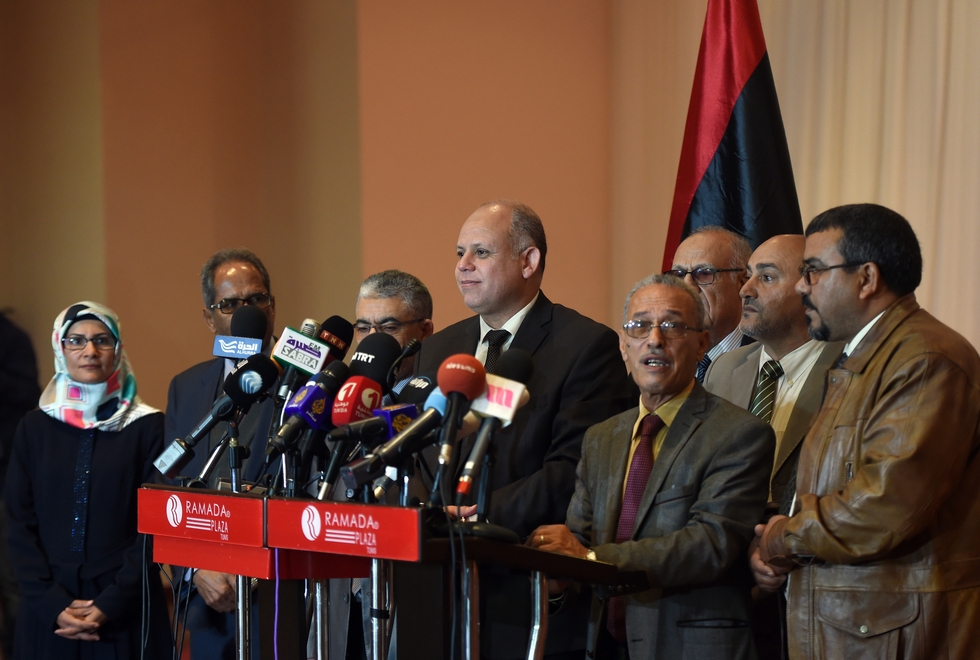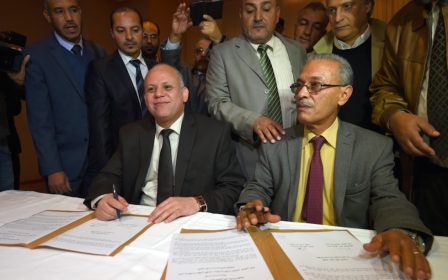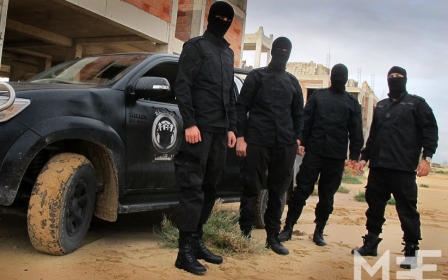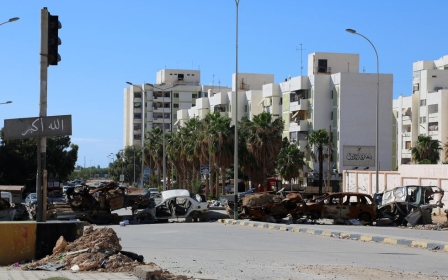UN process only way forward for Libya peace deal: US, EU

Ambassadors to Libya from several EU countries and the US warned on Tuesday against attempts to derail a UN-brokered peace deal, insisting it is the only way forward.
A statement by the ambassadors and special envoys of Britain, France, Germany, Italy, Spain and the US, along with the head of the EU delegation, came after members of Libya's rival parliaments announced a deal of their own this weekend that was reached without UN participation.
“No last minute attempt to derail the UN driven process will succeed,” said the statement from the EU and US representatives.
The "Libyan-Libyan" agreement announced in Tunis on Sunday comes just a little over a month after leaked emails emerged, including one published on Middle East Eye, showing that the former UN envoy to Libya, Bernadino Leon, worked covertly with the UAE to support one side of Libya’s civil war while serving as the key mediator between the warring parties.
The agreement - which the Libyan Herald described on Tuesday as widely seen as "a wrecking procedure" - has already drawn strong criticism from members of the Tobruk-based House of Representatives (HoR), including 92 members who signed a statement on Sunday putting their support behind the UN-led dialogue.
“We will not accept wasting a whole year of effort for the initiative to take us back to zero while the nation suffers,” one of the HoR signatories told al-Wasat newspaper.
Some members of the General National Congress (GNC) have also reportedly criticised the Libyan-Libyan deal while the Libya's Muslim Brotherhood has issued a statement backing it.
Several participants in the UN-led process under Leon over the past year had complained that he limited face-to-face dialogue between the two parties. When the agreement was announced on Sunday, some of those who were present highlighted the lack of international mediation involved.
“We met, shook hands and sat down and talked together, without any help from anyone else,” Said al-Khattaly, a member of the Tripoli-based GNC, told the Libya Herald.
Tunis agreement a step forward?
Analysts, however, said that while the Tunis agreement is a clear response to "Leon-gate" and that contact between the two parties is a positive signal, there is concern that competing Libyan peace initiatives could further prolong chaos.
“I don’t think that there is time to create an alternative track,” Mattia Toaldo, a policy fellow in the Middle East and North Africa Programme at the European Council on Foreign Relations, told Middle East Eye.
“If [the Tunis agreement] becomes just a holding game, not to sign an agreement, then it could backfire and that’s my fear at the moment.”
Mohamed Eljarh, a fellow with the Atlantic Council’s Hariri Centre for the Middle East, said HoR’s deputy president Emhamed Shaib told him that none of the HoR delegates in Tunis had been authorised to sign a deal on behalf of the Tobruk-based government.
“This deal isn’t really a deal because the HoR did not discuss or authorise any signature on it,” he told MEE. Instead, he said, many Libyan parties and the international community see the announcement is “nothing more than an attempt by the GNC and some Islamist factions in Tripoli to try and bargain for some more concessions from the political dialogue process”.
Even facing steep criticism, the emergence of a Libyan-Libyan agreement still puts the UN – and the new Libya envoy, Martin Kobler - in a tough position, said Jason Pack, a researcher of Libyan history at Cambridge University, on Libya-Analysis.com.
“By taking a hardnosed stance, the UN could be seen to be moving towards recognising its own Libyan government ... a move that could embolden locally legitimate hardliners and even alienate potential supporters of the deal,” he wrote on Monday.
“Kobler risks squandering the little traction that remains between the UN and key Libyan political factions and their support for the UN process, in addition to showing the high-handedness of the UN and hence inadvertently legitimising the weaker aspects of the Libyan-Libyan process.”
While the message from Western capitals on Tuesday is that the Tunis agreement participants need to get on board with the UN-led process, the UN also needs to take Libyan initiatives like the one in Tunis into account, Toaldo said.
Kobler met earlier on Monday with the agreement’s participants and that “sent them a signal that someone is listening, that there is an open hand from the UN,” he said.
"I think one has to ask the supporters of the Tunis agreement to show their cards – what have you got that is not already in the UN agreement, can you deliever something also on security, who is supporting you and so on," he added.
Middle East Eye propose une couverture et une analyse indépendantes et incomparables du Moyen-Orient, de l’Afrique du Nord et d’autres régions du monde. Pour en savoir plus sur la reprise de ce contenu et les frais qui s’appliquent, veuillez remplir ce formulaire [en anglais]. Pour en savoir plus sur MEE, cliquez ici [en anglais].




